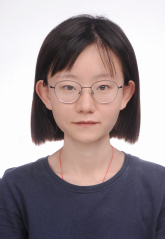個(gè)人(rén)資料
教育經曆工作經曆個(gè)人(rén)簡介華東師範大(dà)學心理(lǐ)與認知科學學院副教授。主要研究方向是概念與知識的(de)神經表征,通(tōng)過fMRI等神經影(yǐng)像學技術探索如何通(tōng)過腦(nǎo)活動解碼思想。在University of South Carolina獲得(de)博士學位,在Carnegie Mellon University接受博士後訓練。 招生方向:語言與認知 主持項目 國家自然科學基金青年項目:抽象概念的(de)隐喻化(huà)神經表征,2022-2024 Selected publications (* correspondence) Wang J.*, Lin H., & Cai Q.* (2023) How Grammar Conveys Meaning: Language-specific spatial encoding patterns and cross-language commonality in higher-order neural space. Journal of Neuroscience. doi: 10.1523/JNEUROSCI.0599-23.2023 Zhang R. ǂ, Wang J. ǂ, Lin H., Turk-Browne N.B., & Cai Q.* (2023) Neural signatures of second language proficiency in narrative processing. Cerebral Cortex. (ǂEqual contribution) Li L., Zhao W., Song M., Wang J.*, & Cai Q.* (2023) CCLOOW: Chinese children’s lexicon of oral words. Behavior Research Methods. doi: 10.3758/s13428-023-02077-6 Feng J., Mak H.Y., Wang J.*, & Cai Q.* (2022) How characters are learned leaves its mark on the neural substrates of Chinese reading. eNeuro 9: ENEURO.0111-22.2022 Wang J., Cherkassky V.L., & Just M.A. (2017) Predicting the brain activation pattern associated with the propositional content of a sentence: modeling neural representations of events and states. Human Brain Mapping. 38(10). doi: 10.1002/hbm.23692 Just M.A.ǂ, Wang J.ǂ, & Cherkassky, V.L. (2017) Neural representations of the concepts in simple sentences: concept activation prediction and context effects. Neuroimage. 157: 511-520. (ǂEqual contribution) Wang J., Baucom L.B., & Shinkareva S.V. (2013) Decoding abstract and concrete concept representation based on single-trial fMRI data. Human Brain Mapping. 34: 1133-1147 Wang J., Conder J.A., Blitzer D.N., & Shinkareva S.V. (2010) Neural representation of abstract and concrete concepts: a meta-analysis of neuroimaging studies. Human Brain Mapping. 31: 1459-1468 社會兼職研究方向從方法論的(de)角度,關注如何通(tōng)過fMRI等手段測量的(de)腦(nǎo)活動解碼思想。 從科學主題的(de)角度,關注概念的(de)産生與表征機制,知識的(de)神經組織規律,語言能力的(de)認知神經基礎。 招生與培養學術型碩士研究生招生方向:語言與認知 對(duì)入組的(de)研究生同學,我視自己的(de)職責爲指導你發展研究項目,獲得(de)學位,幫助你踏上進一步的(de)求學之路,或支持你的(de)其他(tā)職業選擇。 我會深度參與你研究的(de)各個(gè)階段,并在和(hé)你的(de)相處中找到适合你的(de)工作和(hé)溝通(tōng)方式。你可(kě)以在初期花一些時(shí)間尋找自己的(de)研究興趣,也(yě)可(kě)以立刻投身一個(gè)明(míng)确的(de)研究問題。你可(kě)以在各個(gè)層面尋求我的(de)指導,也(yě)可(kě)以選擇相當程度的(de)獨立自主。你可(kě)以頻(pín)繁與我討(tǎo)論交流,也(yě)可(kě)以要求低頻(pín)的(de)高(gāo)質量溝通(tōng)。任何一種方式都服務這(zhè)樣的(de)目的(de):爲你成長(cháng)爲一個(gè)科學工作者做(zuò)好思維、知識和(hé)技能的(de)準備。即便你不期望或不适合成爲一個(gè)科學工作者,你也(yě)會在此過程中獲得(de)有用(yòng)的(de)技能和(hé)思考方式。 開授課程參與課程 本科:
研究生:
科研項目主持 國家自然科學基金青年項目:抽象概念的(de)隐喻化(huà)神經表征,2022-2024 學術成果* correspondence Wang J.*, Lin H., & Cai Q.* (2023) How Grammar Conveys Meaning: Language-specific spatial encoding patterns and cross-language commonality in higher-order neural space. Journal of Neuroscience. doi: 10.1523/JNEUROSCI.0599-23.2023 Zhang R. ǂ, Wang J. ǂ, Lin H., Turk-Browne N.B., & Cai Q.* (2023) Neural signatures of second language proficiency in narrative processing. Cerebral Cortex. (ǂEqual contribution) Li L., Zhao W., Song M., Wang J.*, & Cai Q.* (2023) CCLOOW: Chinese children’s lexicon of oral words. Behavior Research Methods. doi: 10.3758/s13428-023-02077-6 Feng J., Mak H.Y., Wang J.*, & Cai Q.* (2022) How characters are learned leaves its mark on the neural substrates of Chinese reading. eNeuro 9: ENEURO.0111-22.2022 Gao C., Baucom L.B., Kim J., Wang J., Wedell D.H., & Shinkareva S.V. (2019) Distinguishing abstract from concrete concepts in supramodal brain regions. Neuropsychologia 131:102–110 Wang J., Cherkassky V.L., & Just M.A. (2017) Predicting the brain activation pattern associated with the propositional content of a sentence: modeling neural representations of events and states. Human Brain Mapping. 38(10). doi: 10.1002/hbm.23692 Just M.A.ǂ, Wang J.ǂ, & Cherkassky, V.L. (2017) Neural representations of the concepts in simple sentences: concept activation prediction and context effects. Neuroimage. 157: 511-520. (ǂEqual contribution) Yang Y., Wang J., Bailer C., Cherkassky V.L., & Just M.A., (2017) Commonalities and differences in the neural representations of English, Portuguese, and Mandarin sentences: when knowledge of the brain-language mappings for two languages is better than one. Brain and Language. 175: 77-85. Wang J., Cherkassky V.L., Yang Y., Chang K.K., Vargas R., Diana N., & Just M.A. (2016) Identifying object’s thematic role in an event from fMRI-measured neural representation. Cognitive Neuropsychology. doi:10.1080/02643294.2016.1182480 Yang Y., Wang J., Bailer C., Cherkassky V., & Just M.A. (2016) Commonality of neural representations of sentences across languages: predicting brain activation during Portuguese sentence comprehension using an English-based model of brain function. Neuroimage. 146: 658-666. Kim J., Wang J., Wedell D.H., & Shinkareva S.V. (2016) Identifying core affect in individuals from fMRI responses to dynamic naturalistic audiovisual stimuli. PLoS ONE11(9): e0161589. Shinkareva S.V., Wang J., Kim J., Facciani M.J., Baucom L.B., & Wedell D.H. (2014) Representations of modality-specific affective processing for visual and auditory stimuli derived from fMRI data. Human Brain Mapping. 35: 3558-3568 Wang J., Baucom L.B., & Shinkareva S.V. (2013) Decoding abstract and concrete concept representation based on single-trial fMRI data. Human Brain Mapping. 34: 1133-1147 Shinkareva S.V., Wang J., & Wedell, D.H. (2013) Examining similarity structure: Multidimensional scaling and related approaches in neuroimaging. Computational and Mathematical Methods in Medicine. doi:10.1155/2013/796183 Henderson J.M., Shinkareva S.V., Wang J., Luke S.G., & Olejarczyk J. (2013) Predicting cognitive states from eye movements. PLoS ONE8(5): e64937 Baucom L.B., Wedell D.H., Wang J., Blitzer D.N., & Shinkareva S.V. (2012) Decoding the neural representation of affective states. Neuroimage. 59: 718-727 Murdaugh D.L., Shinkareva S.V., Deshpande H.R., Wang J., Pennick M.R., & Kana R.K. (2012) Differential deactivation during mentalizing and classification of autism based on default mode network connectivity. PLoS ONE 7(11): e50064. Wang J., Conder J.A., Blitzer D.N., & Shinkareva S.V. (2010) Neural representation of abstract and concrete concepts: a meta-analysis of neuroimaging studies. Human Brain Mapping. 31: 1459-1468 Shinkareva S.V., Gudkov V., & Wang J. A Network Analysis Approach to fMRI Condition-Specific Functional Connectivity. arXiv:1008.0590v1 (2010). 榮譽及獎勵 |

|
王婧 |